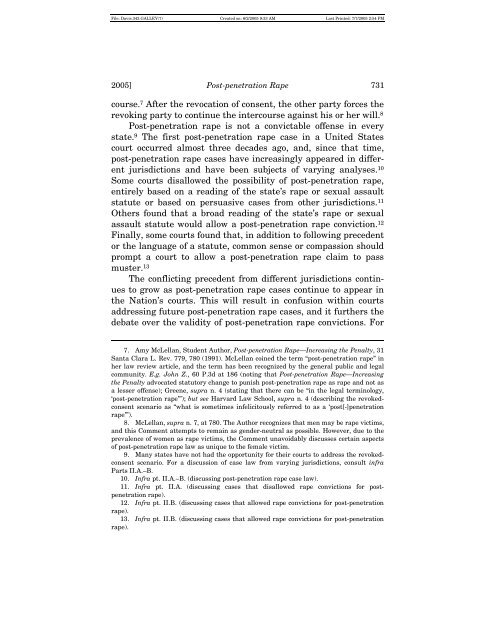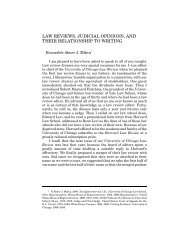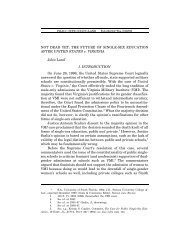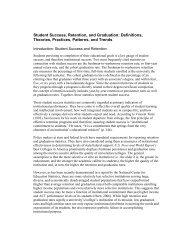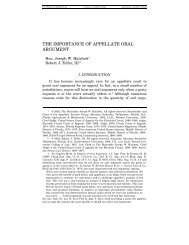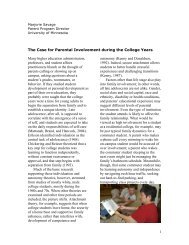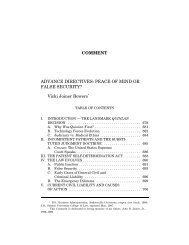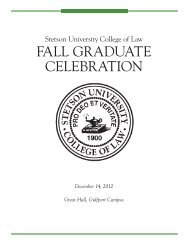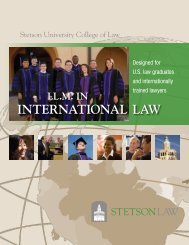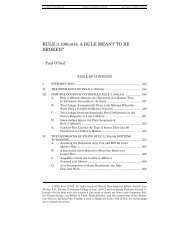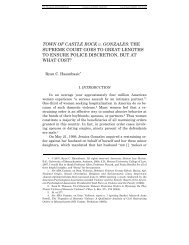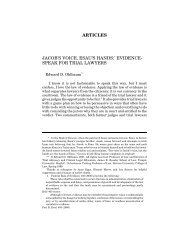the evolution of post-penetration rape law - Stetson University ...
the evolution of post-penetration rape law - Stetson University ...
the evolution of post-penetration rape law - Stetson University ...
Create successful ePaper yourself
Turn your PDF publications into a flip-book with our unique Google optimized e-Paper software.
File: Davis.343.GALLEY(7) Created on: 6/2/2005 9:33 AM Last Printed: 7/7/2005 2:54 PM2005] Post-<strong>penetration</strong> Rape 731course. 7 After <strong>the</strong> revocation <strong>of</strong> consent, <strong>the</strong> o<strong>the</strong>r party forces <strong>the</strong>revoking party to continue <strong>the</strong> intercourse against his or her will. 8Post-<strong>penetration</strong> <strong>rape</strong> is not a convictable <strong>of</strong>fense in everystate. 9 The first <strong>post</strong>-<strong>penetration</strong> <strong>rape</strong> case in a United Statescourt occurred almost three decades ago, and, since that time,<strong>post</strong>-<strong>penetration</strong> <strong>rape</strong> cases have increasingly appeared in differentjurisdictions and have been subjects <strong>of</strong> varying analyses. 10Some courts disallowed <strong>the</strong> possibility <strong>of</strong> <strong>post</strong>-<strong>penetration</strong> <strong>rape</strong>,entirely based on a reading <strong>of</strong> <strong>the</strong> state’s <strong>rape</strong> or sexual assaultstatute or based on persuasive cases from o<strong>the</strong>r jurisdictions. 11O<strong>the</strong>rs found that a broad reading <strong>of</strong> <strong>the</strong> state’s <strong>rape</strong> or sexualassault statute would allow a <strong>post</strong>-<strong>penetration</strong> <strong>rape</strong> conviction. 12Finally, some courts found that, in addition to following precedentor <strong>the</strong> language <strong>of</strong> a statute, common sense or compassion shouldprompt a court to allow a <strong>post</strong>-<strong>penetration</strong> <strong>rape</strong> claim to passmuster. 13The conflicting precedent from different jurisdictions continuesto grow as <strong>post</strong>-<strong>penetration</strong> <strong>rape</strong> cases continue to appear in<strong>the</strong> Nation’s courts. This will result in confusion within courtsaddressing future <strong>post</strong>-<strong>penetration</strong> <strong>rape</strong> cases, and it fur<strong>the</strong>rs <strong>the</strong>debate over <strong>the</strong> validity <strong>of</strong> <strong>post</strong>-<strong>penetration</strong> <strong>rape</strong> convictions. For7. Amy McLellan, Student Author, Post-<strong>penetration</strong> Rape—Increasing <strong>the</strong> Penalty, 31Santa Clara L. Rev. 779, 780 (1991). McLellan coined <strong>the</strong> term “<strong>post</strong>-<strong>penetration</strong> <strong>rape</strong>” inher <strong>law</strong> review article, and <strong>the</strong> term has been recognized by <strong>the</strong> general public and legalcommunity. E.g. John Z., 60 P.3d at 186 (noting that Post-<strong>penetration</strong> Rape—Increasing<strong>the</strong> Penalty advocated statutory change to punish <strong>post</strong>-<strong>penetration</strong> <strong>rape</strong> as <strong>rape</strong> and not asa lesser <strong>of</strong>fense); Greene, supra n. 4 (stating that <strong>the</strong>re can be “in <strong>the</strong> legal terminology,‘<strong>post</strong>-<strong>penetration</strong> <strong>rape</strong>’’’); but see Harvard Law School, supra n. 4 (describing <strong>the</strong> revokedconsentscenario as “what is sometimes infelicitously referred to as a ‘<strong>post</strong>[-]<strong>penetration</strong><strong>rape</strong>’”).8. McLellan, supra n. 7, at 780. The Author recognizes that men may be <strong>rape</strong> victims,and this Comment attempts to remain as gender-neutral as possible. However, due to <strong>the</strong>prevalence <strong>of</strong> women as <strong>rape</strong> victims, <strong>the</strong> Comment unavoidably discusses certain aspects<strong>of</strong> <strong>post</strong>-<strong>penetration</strong> <strong>rape</strong> <strong>law</strong> as unique to <strong>the</strong> female victim.9. Many states have not had <strong>the</strong> opportunity for <strong>the</strong>ir courts to address <strong>the</strong> revokedconsentscenario. For a discussion <strong>of</strong> case <strong>law</strong> from varying jurisdictions, consult infraParts II.A.–B.10. Infra pt. II.A.–B. (discussing <strong>post</strong>-<strong>penetration</strong> <strong>rape</strong> case <strong>law</strong>).11. Infra pt. II.A. (discussing cases that disallowed <strong>rape</strong> convictions for <strong>post</strong><strong>penetration</strong><strong>rape</strong>).12. Infra pt. II.B. (discussing cases that allowed <strong>rape</strong> convictions for <strong>post</strong>-<strong>penetration</strong><strong>rape</strong>).13. Infra pt. II.B. (discussing cases that allowed <strong>rape</strong> convictions for <strong>post</strong>-<strong>penetration</strong><strong>rape</strong>).


